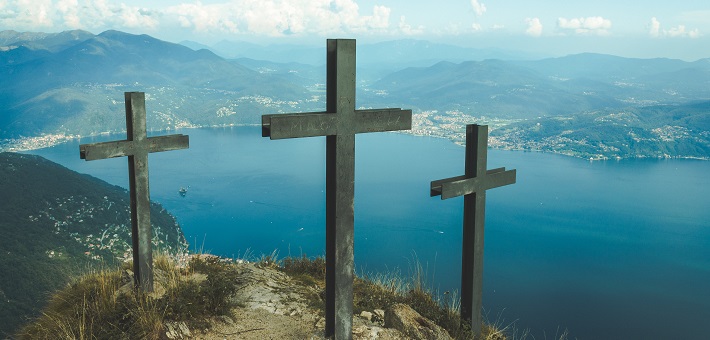Commentary on Psalm 31:9-16
What are the stories that you replay over and over again in your mind? What are notes that you choose to hear in your inner ear long after an event has played its tune? What are the contours of fear that rise before and beneath your feet as you travel through this life? Where is your hope when all hope seems to have faded away?
To my ears the psalmist’s poetry is asking us questions in the middle of our own existential life questions. They are questions that connect with our visceral questions. They are the ones we may not want asked, or they are questions that are too close to the pain of life or too aligned with our missteps and mistakes of the past. The writer writes from a place most people have known and where many live at this moment: distress, sorrow, grief, despair, brokenness, and so on.
The land of despair is like a shadow that doesn’t leave even when the sun is shining at midday. The place of threat can be a place that feels as if it is ever around and within, and it seems there is little room for escape. The power of grief can weigh like heavy weights on shoulders unable to be removed, and each footstep feels like a labored endeavor.
Whatever the contours were of the writer’s experience (here the writer is ascribed as David), it is clear that he felt as if there was no escape from his present predicament and it troubled his every thought. If this was written at the time in which Absalom sought to bring down David’s throne and place himself upon it (2 Samuel 15), then we might discern something of the cause of David’s fear, anguish, and despair.
One might join the writer’s refrains and say things like: I have no hope except in God’s mercy, love, and grace. I have no hope if God doesn’t exist. The fleeting moments of existence fly toward an abyss to be forever forgotten if there is no meaning beyond the meaning I choose to make for myself and my place in the world. If evil triumphs and wickedness has no price to pay or there is no resolution or restitution or reconciliation, then it seems all is lost.
Each packet of grief, measure of mistakes, stone of sin, ounce of guilt, measure of shame gathered into a personal bag of troubles worn on shoulders can add to and increase one’s experience of despair.
The psalmist sings of feelings of despair, and he sings words of trust and hope in the midst of it. The echoes reverberate off the walls of our inner spaces where our own grief, despair, guilt, and shame may linger. The instructions at the outset of the psalm, “For the Director of Music. A Psalm of David,” invite the psalm to be sung by those who know the slopes and valleys of life. It is an invitation to sing in the middle of trouble a song that knows that trouble doesn’t last in the presence of God.
The psalm writer doesn’t leave us in a desolate place to think that despair is all there is to life. Instead, the writer opens our eyes to vistas beyond the edges of our experience and invites us to hear a song that sings even in the harshest of conditions. “‘You are my God.’ My times are in your hands; deliver me from the hands of my enemies, from those who pursue me. Let your face shine on your servant; save me in your unfailing love” (Psalm 31:14–16, New International Version).
“My times are in your hands” is a refrain I could carry anywhere. The words have only become richer and more imbued with meaning as I move closer to the end of my existence on earth. Having lived nearly six and a half decades, I discover each day an infused hope layered within David’s sonic tones that serve as reminders of a God who knows the span of our existence and who loves us for who we are and not what we have done or left undone.
David’s song rising from the depths of despair sings of a God greater than despair, and of a God who will sustain us no matter what life might bring toward us or we might bring toward ourselves.
The verses of truth latticed in human experience within this psalm connect with people across the ages. Commentaries on Psalm 31 lift out the verses elsewhere in the Bible that reprise lines from Psalm 31.1
We discover Jonah singing the tones of trust while he languishes inside the whale or big fish (Jonah 2:8). We hear them sung by Jeremiah as he undergoes hardship because of speaking truth to power (chapters 6, 20, 46, and 49). We hear the apostle Paul opine the tones to encourage the young Christian congregation at Corinth to remain vital and strong in the face of opposition (1 Corinthians 16:13). And we discover that Jesus himself utters words from this psalm from the cross (Luke 23:26).
Trust in God despite the adversity in which one finds oneself is a refrain carried through the psalm. This trust finds echoes across the books of the Bible, within Christian church history, and within contemporary contexts. There is something in the power of words of truth that can lift spirits and bring hope in the midst of disaster and despair.
I know this firsthand. While I was working at Pacific Theological College, Suva, Fiji, in 2000, a political coup happened. The Parliament building had been overtaken by those who didn’t like the direction that the country was taking and decided it was time for a change. They took parliamentarians hostage and democracy was diminished that day. The young and old Fijian men walked past our door armed with cane knifes and zealous intent to reassert a political ideal of indigenous Fijian rule. Each day and throughout the day I heard in my mind the words, “Trust me [God], and it will be all right.”
My family and I lived on the PTC campus about one block from the Parliament building, and we could hear occasional gunfire. One day the Fijian military set up machine gun emplacements on the road leading up to the Parliament building. The rebels didn’t welcome this assertion of power and proceeded down the hill from the Parliament building toward the Fijian military, who were firing their guns at the ground and in the air next to the campus to deter them. That day I called the U.S. Deputy Ambassador, and he picked up my family in an armored car and brought us to his home.
A few days later we traveled through the night through military checkpoints toward the other side of the island and eventually left the country. Throughout that experience I heard the refrain “Trust me, and it will be all right.” David’s psalm came to mind, and it has been sung across the past 3,000 years with notes that touched hearts and minds with hope and courage to face whatever would come.
When the U.S. Capitol was overrun by insurrectionists on January 6, 2021, I couldn’t help but make comparisons to the Fijians who had overrun the Fijian Parliament building 21 years earlier. Zealous for a cause, rooted in an ideology, fueled by desires for a different set of definitions of what it meant to be a country, they counted themselves as the patriots. Democracy is always a breath away from being lost, and yet, even if it were lost, the refrain remains the same. “Trust me, and it will be all right.”
David the psalm writer was embroiled in a political landscape that threatened his very existence. Yet, even in a space of uncertainty, his words sang a song of trust in God no matter what the conditions of life might be. Even in despair the word of God breathes an eternal hope of God’s presence.
Notes
- See Enduring Word Commentary, https://enduringword.com/bible-commentary/psalm-31/.


April 10, 2022